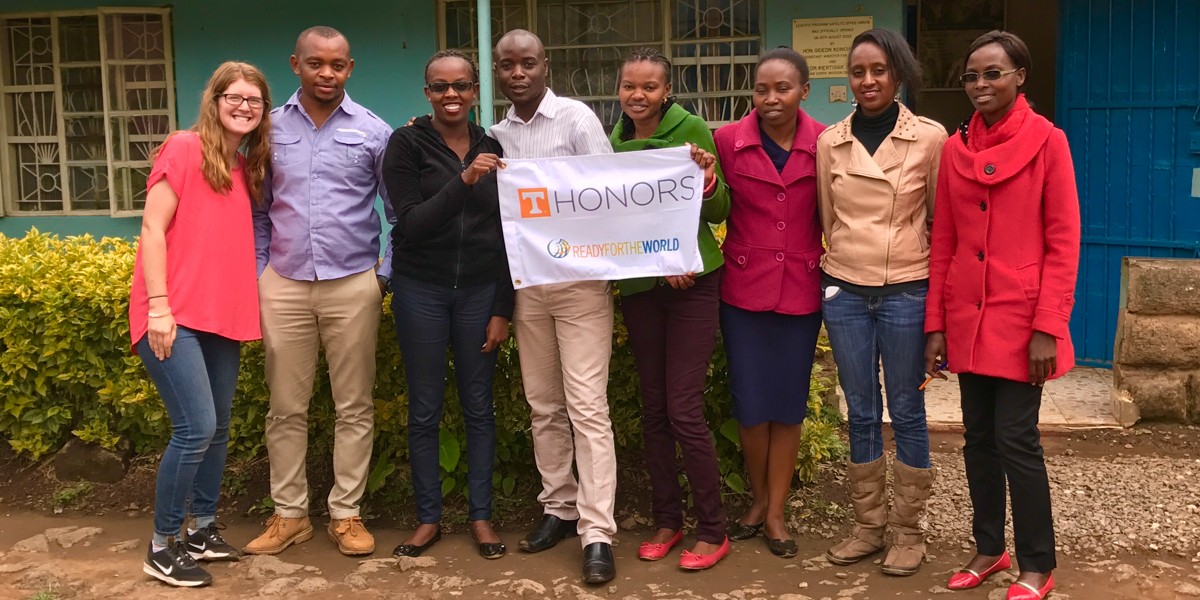By Jaime Marquis
“They’re opportunities, not requirements” At the time of honors orientation, I didn’t understand the mindset my parents were trying to relay to me. I mistakenly saw the Chancellor’s Honors Program requirements simply as another checklist I had to complete by the end of each semester, not as an opportunity for personal growth. That was before I knew the extent to which the CHP Ready for the World requirement would shape my college career into what it is today.
When I came to the University of Tennessee, I knew a few things about myself. Science had always been my favorite class, I loved working with kids, I had an interest in world travel, and I valued helping others. However, it was not until delving into the CHP that I discovered how each of these passions would later come together as one.
During my first year, my participation in CHP could best be summarized as going through the motions. In my mind, I had checked off each requirement and was satisfied with my work. Yet I struggled to see the big picture—one that illuminated how CHP could work alongside my nutrition major and shape my various interests into a single focus.

It was not until meeting with my honors advisor that I would begin to see the CHP in a new light. I went into the meeting prepared to discuss solely how my honors classes were going, but my advisor showed a greater interest in me. She asked me how my summer went, and I began to tell her about my recent trip to Pena Blanca, Honduras, as a nutrition volunteer. She quickly picked up on my excitement for the trip and began talking about how she could help me relate this experience back to the CHP Ready for the World (RFW) program. Together, we explored my options and she brought up the possibility of going on an honors alternative break program focused on food security and justice.
In the spring of my sophomore year, with the help of the CHP, it seemed as if everything was falling into place. I returned from my honors alternative break with a larger knowledge of food injustice solutions such as community gardens, food banks, and soup kitchens. The trip really sparked my interest in food security, and I began to look at service through a different lens. I was encouraged to invest in communities and focus on the root causes of major social issues.
Additionally, the CHP community service requirement led me to serve at a garden club at a local middle school through the Boys and Girls Club. This experience combined my recent interest in food security with my love for working with children and allowed me to make deep connections with the students I worked alongside. In summary, CHP’s community service requirements taught me the value of investing deeply in communities—which means both celebrating a community’s achievements and helping them create more opportunities for success.
 As a result of further conversations with my CHP advisor, I came across an opportunity to travel to the outskirts of Nairobi, Kenya and work in a pediatric nutrition clinic. Through the RFW grant, I studied and interned at Lea Toto Kawangware, a clinic for children affected by HIV. It was there that my interest in global food security was confirmed. My research abroad on the consequences of food security combined all my interests—science, working with kids, traveling, and, most importantly, serving others. My trip to Kenya continues to motivate me, and I am working to create an honors thesis that builds on the work I have done.
As a result of further conversations with my CHP advisor, I came across an opportunity to travel to the outskirts of Nairobi, Kenya and work in a pediatric nutrition clinic. Through the RFW grant, I studied and interned at Lea Toto Kawangware, a clinic for children affected by HIV. It was there that my interest in global food security was confirmed. My research abroad on the consequences of food security combined all my interests—science, working with kids, traveling, and, most importantly, serving others. My trip to Kenya continues to motivate me, and I am working to create an honors thesis that builds on the work I have done.
The CHP continues to enhance my college experience. CHP-inspired conversations led to the opportunities that shaped the person I am today, and motivate me to become a public health professional. Completing the program goes beyond fulfilling requirements. I am forever thankful for the possibilities the CHP enabled me to discover as I sought to find the intersection of my personal passions and my professional and academic goals.
